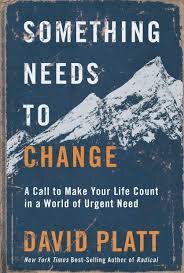Something Needs to Change - A Review
David Platt wrote Radical in 2010. The subtitle of that book was Taking Back Your Faith from the American Dream. That compelling book was a call to resist the materialism and superfluous comforts of the idealized American existence and pursue a missional alternative that included frugal living, generous giving, and the willingness to go to all the nations with the gospel.
In the years since I’ve met many people who have read the book, who studied it in a small group or as a church, or who have heard its core message summarized. Most of them continue to live a typical American middle-class lifestyle, with a comfy house, fun vacations, and a great hope in retirement. Many of the accounts of studying the book include Christians meeting in the expansive homes of the American suburbs enjoying rich desserts. The irony is often lost on those who recount it.
For Platt, who spent four years at the helm of the Southern Baptist Convention’s International Mission Board, the irony still seems to be too much. He has recently published a volume, Something Needs to Change: A Call to Make Your Life Count in a World of Urgent Need, that reissues the call of Radical and seeks to make it more personal.
Something Needs to Change is a memoir or sorts that recounts a seven-day trip Platt took through the Himalayas just before he accepted the call to the International Mission Board. He outlines the devastating poverty he encountered, the horrific lostness, and the depths of human depravity that were evidenced in the communities Platt encountered.
This book is nuanced. It is not merely a 200-page guilt trip. It is an extended meditation about real needs by someone who does not have all of the answers. Platt seeks to uncover the desperate needs of the world, while still wrestling with our call to live in the place God has given us. By the end of the book, it should be clear to the reader that Platt is not proposing a one-size-fits-all solution, but rather calling for an unfettered reconsideration of our priorities and actions.
Platt is likely to face criticism from both political poles about this volume. He recognizes the deep humanitarian needs of those living in abject poverty and sees that as humans we cannot ignore them. At the same time, he cannot fail to note the even deeper need to meet to alleviate the spiritual poverty of those living apart from Christ. His proposal is to develop a both-and solution, but by all means to do something.
To often good theory dies on the pages of the book and never makes it to the hands of the reader. In Western culture we talk about the needs of the poor, but try to pay off the government to deal with their problems while hoping to keep their hands (and lives) free of the concerns of the dirty poor. In the same way, some groups claim earnest concern for the environment, but continue to drive excessively large vehicles excessively long distances while consuming excessively large quantities of beverages shipped and excessively long distance and presented in excessively wasteful packaging.
As Platt notes, something has to change. His book is a call for people to consider what that change will look like in their lives. For the business person, it may be to expand their company into a lesser served area of the world to provide jobs and resources to those who need it. For some, it may be to take marketable skills they have acquired and apply them to humanitarian solutions for areas reached neither by the gospel nor the material abundance of Western culture. There are no firm prescriptions because for each of us the task is different and our ability to contribute is uniquely shaped by God’s gifts to us.
Above all, however, we need to stop doing nothing and do something.
Platt’s book in another reminder that many of us live lives of self-satisfaction, oblivious to the great needs of the world. We will be accountable for how we have used our time and resources one day when we stand before a holy God. On that day some of our accounts of purchased comforts and wasted days will be a source of sorrow. Something Needs to Change is a reminder that day is coming. We should live like we expect it.
Note: I received a gratis copy of this volume from the publisher with no expectation of a positive review.











There’s no reason to doubt that Jesus was nailed to the cross. Ultimately, I trust what Scripture says about Jesus’s crucifixion because I also trust what it says about his resurrection. And that’s what we should be celebrating this week.